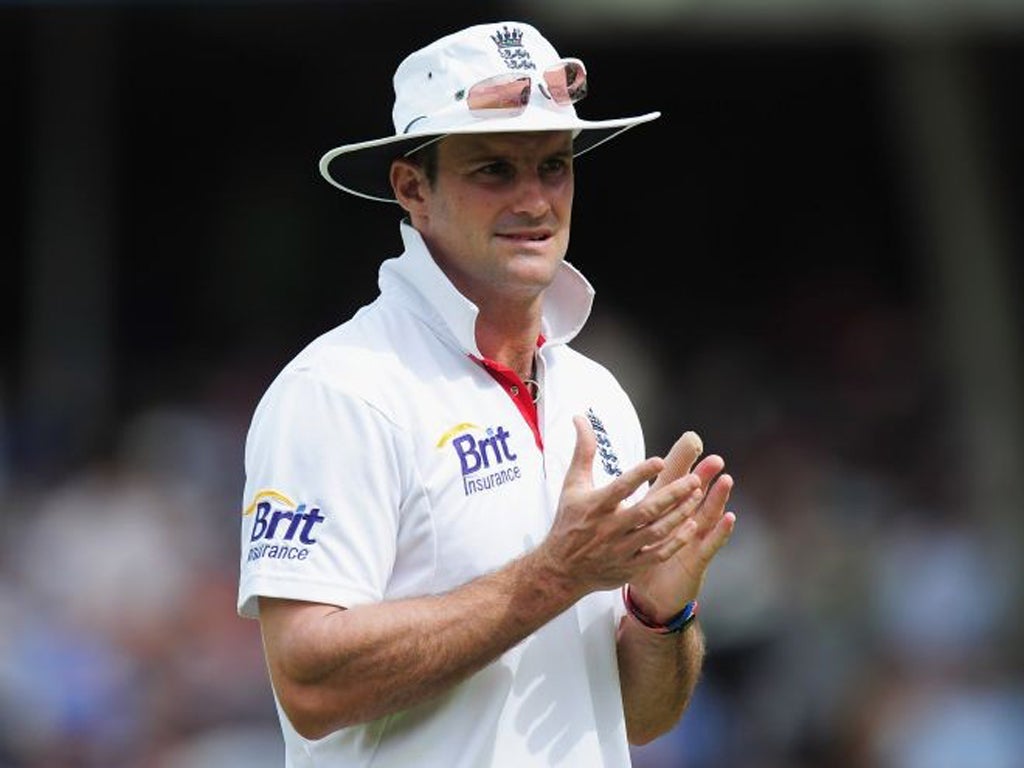Andrew Strauss hits out at ICC's 'toothless' security unit
England captain worried that spot-fixing was only exposed by newspaper, not official investigators

Your support helps us to tell the story
From reproductive rights to climate change to Big Tech, The Independent is on the ground when the story is developing. Whether it's investigating the financials of Elon Musk's pro-Trump PAC or producing our latest documentary, 'The A Word', which shines a light on the American women fighting for reproductive rights, we know how important it is to parse out the facts from the messaging.
At such a critical moment in US history, we need reporters on the ground. Your donation allows us to keep sending journalists to speak to both sides of the story.
The Independent is trusted by Americans across the entire political spectrum. And unlike many other quality news outlets, we choose not to lock Americans out of our reporting and analysis with paywalls. We believe quality journalism should be available to everyone, paid for by those who can afford it.
Your support makes all the difference.Andrew Strauss, the England captain, believes the International Cricket Council should be doing more to combat the threat posed by fixing. Strauss, speaking in the aftermath of the imprisonment of three Pakistan players on corruption charges on Thursday, described the governing body's Anti-Corruption and Security Unit as a "toothless tiger."
Strauss, who will lead England in a three-Test series against Pakistan in January, welcomed the sentences imposed on Salman Butt, Mohammad Asif and Mohammad Amir for spot-fixing during the fourth Test against England at Lord's last year. "It's hard to be happy or satisfied when something like this happens," said Strauss. "It is fantastic that there's been some sort of repercussions for what these guys did and there's some sort of deterrent there."
What concerns Strauss though is how the conspiracy was uncovered – by the News of the World rather than the ICC's security unit – and whether there are enough resources at the disposal of Ronnie Flanagan, the former British policeman who runs the ACSU.
Strauss said: "There's still a lot of questions to be answered because they weren't exposed by any of the cricketing members, they were exposed by the News of the World. I still think the ICC could be doing a lot more than they are doing. Unfortunately, the anti-corruption unit is a pretty toothless tiger. They can't get into the real depth of it all because they haven't got the resources available to them.
"I don't hold it against them, they're doing the best job they possibly can. They can't do sting operations like the News of the World, they can't infiltrate these betting networks. They've tried their best. I'm very hopeful that only a minor percentage of cricketers are involved in it, hopefully that is the case but the truth is we really don't know."
Officers from the ACSU are meeting the Metropolitan Police to assess whether there is enough evidence to open a new investigation into the activities of other Pakistan players, notably Kamran Akmal and Wahab Riaz, both of whom were named repeatedly in the course of the trial and were clients of Mazhar Majeed, the British agent who was also jailed. The ICC seems certain to investigate further.
Strauss, speaking at a Chance to Shine charity event, does not believe that the convictions will have any impact on England's trip to Dubai and Abu Dhabi to play Pakistan in the new year. He said: "You play against 11 other cricketers and one of the strong traits we try to foster within the England team is you worry about yourself and your own performance. That's what we'll be doing in Dubai and it'll be another keenly contested series, as it always is against Pakistan, and what's gone on is water under the bridge."
Tim May, the chief executive of FICA, the international players union, also said he was satisfied that a "loud and clear message" had been sent but voiced concerns that fixing still holds a menacing presence within the game. The former Australian Test player said: "The practice of spot-fixing and other types of fixing still appears to be prevalent in our game despite the millions spent by the ICC on education and the creation of the ACSU. The ICC and it member boards, cricket officials and players all need to take the responsibility of ridding this corruption from cricket."
Australia is set to introduce new laws to make to make match- and spot- fixing illegal. Britain is one of the few countries that already has such legislation and Australia is set to follow suit next year. Cricket Australia had pushed for the laws to be introduced in time for the 2015 World Cup and there is cross-party support for the issue at both state and federal level. Haroon Lorgat, the ICC's chief executive, and Jacques Rogge, president of the International Olympic Committee, have made calls for governments to do more to help sporting bodies combat corruption in sport.
The Pakistan Cricket Board has rejected Amir's claim that players do not receive enough education about fixing. The PCB said that when Amir was awarded a central contract in March 2010 he also signed the ICC code of conduct, available in Urdu and English: "Amir acknowledged that he understood the code and his responsibilities. Amir also committed that he would abide by these rules. Furthermore Amir participated in a number of ICC tournaments ... where he attended anti-corruption lectures."
Join our commenting forum
Join thought-provoking conversations, follow other Independent readers and see their replies
Comments